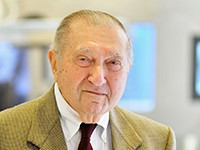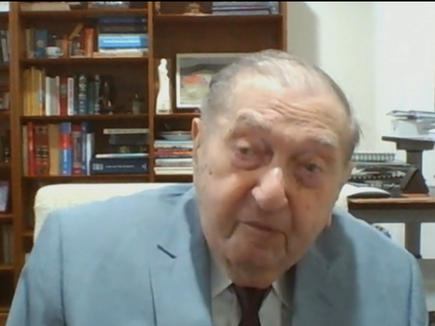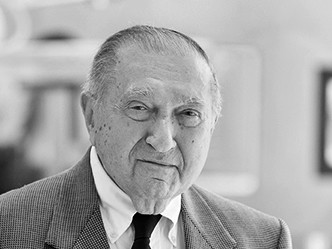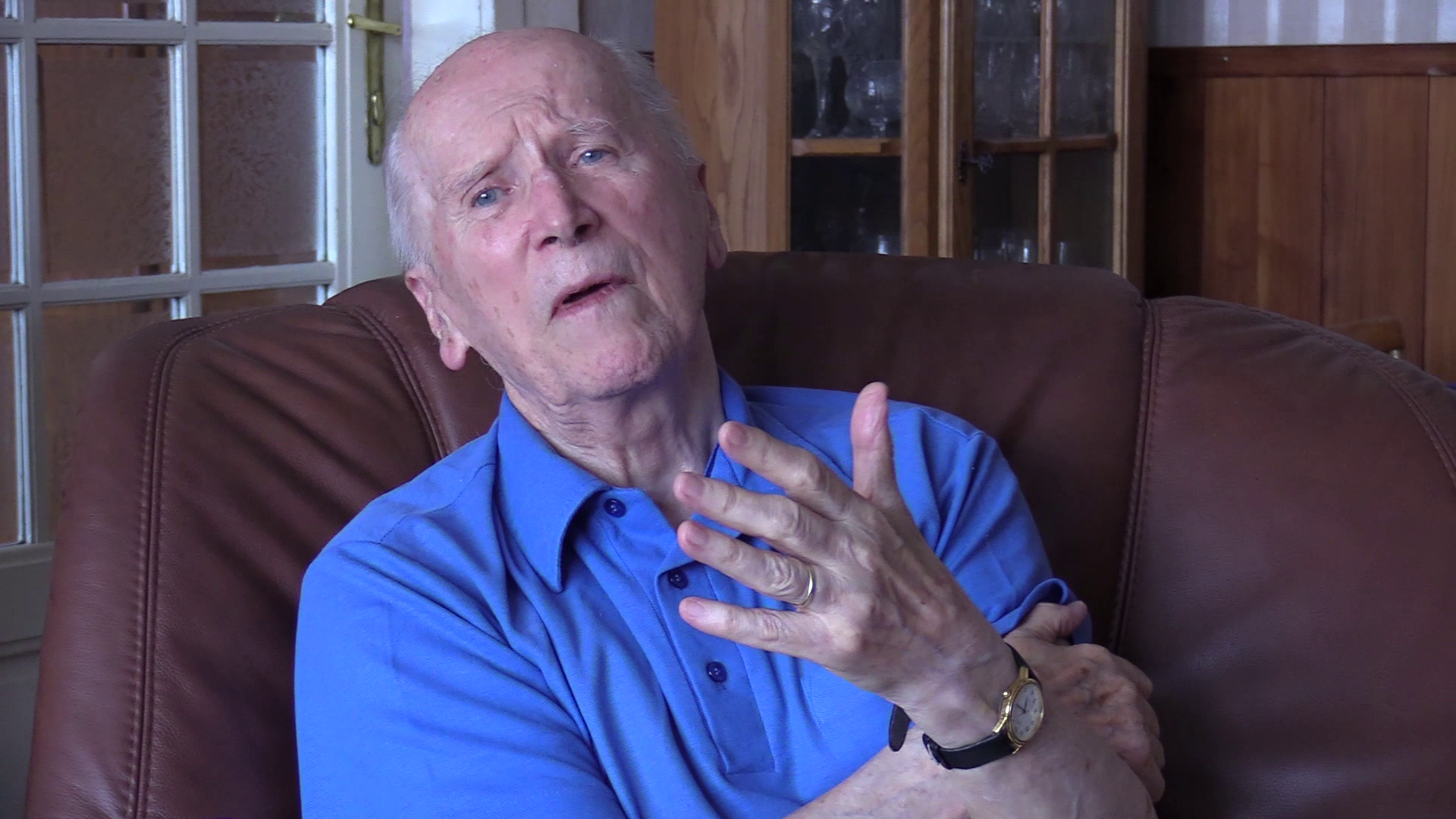
Prof. Vladimír Vonka (31. 7. 1930 – 20. 6. 2025). Photo: Paměť národa
A personal tribute to a prominent personality of Czech virology and oncology with a long-standing relationship to our faculty.
It is with profound sorrow that we learned of the passing of Professor MUDr. Vladimír Vonka, DrSc., on 20 June 2025, following a prolonged illness, just short of his 95th birthday. Professor Vonka was an Emeritus Scientist at the Institute of Haematology and Blood Transfusion, a founding member of the Czech Learned Society, and a long-time collaborator and educator at the Second Faculty of Medicine, Charles University.
Professor Vonka was one of the most distinguished figures in Czech biomedical science during the second half of the 20th and early 21st century. He dedicated his professional life to virology, immunology, and cancer research. His scientific and human legacy endures within the Czech academic community and internationally. A true Renaissance personality, he significantly contributed to global oncology and virology knowledge. I am deeply grateful to have been his pupil during a pivotal early phase of my professional development.
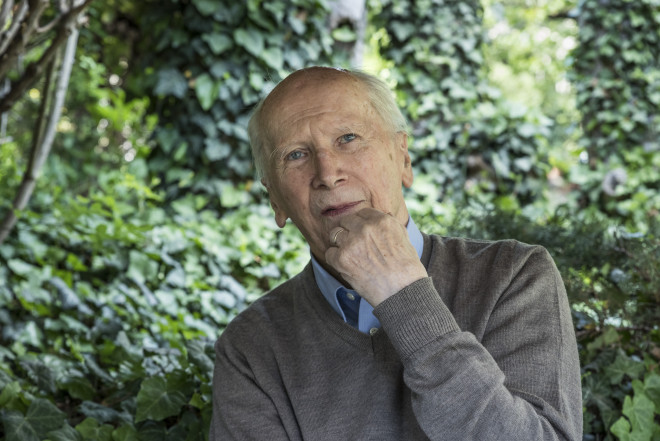
After graduating from the Faculty of Medicine at Charles University (1955), Professor Vonka began his career as a physician in the internal medicine and infectious diseases department in Ústí nad Labem. In 1956, he joined the Institute of Epidemiology and Microbiology in Prague and soon transferred to the renowned Research Institute of Immunology, part of the Institute of Sera and Vaccines (ÚSOL). A key achievement from this period was his participation in Czechoslovakia’s successful polio eradication program – the world’s first such success. During this era, he forged a lifelong collaboration with Professor E. Adam (1922–2024), who was likewise closely associated with the Second Faculty of Medicine. The "Vlasta and Ervín Adam Foundation," initially funded sacrificially from their American and Czech pensions, continues to support promising students and young scientists on international internships.
Recommended
Třikrát jsem přišel o všechno a pořád tu straším, říká prof. Ervín Adam. V listopadu slaví sto let
Rozhovor s virologem, mikrobiologem a donátorem
2. lékařské fakulty
Prof. Ervín Adam o zkušenostech z koncentračních táborů
Přeživší holocaustu, virolog a epidemiolog, který na 2. lékařské fakultě s manželkou umožnil vznik Nadace Vlasty a Ervína Adamových, byl hostem pořadu Hyde Park Civilizace (6. 11. 2021).
Všem doporučoval být aktivní, dokud to jde. Ve 101 letech zemřel virolog, mikrobiolog a donátor 2. lékařské fakulty prof. Ervín Adam
Vzpomíná jeho žák a dlouholetý spolupracovník doc. Milan Macek sr. z Ústavu biologie a lékařské genetiky 2. LF UK a FN Motol.
His research at Baylor College of Medicine in Houston (1964–1965, 1968–1969) proved pivotal. Under the mentorship of Professor Joseph L. Melnick, he studied tumour viruses. This period marks my earliest memories of Professor Vonka, as my father, Associate Professor MUDr. Milan Macek Sr., CSc, worked alongside my mother at the same institution. Thanks to Professor Vonka’s recommendation, my father secured an internship at Baylor. I became friends with his son Richard (who later became a respected manager at several leading global pharmaceutical companies). Our childhood games at the pool of Braeswood Apartments blossomed into a lifelong friendship! I remember Professor Vonka as a tall, genuine gentleman who always devoted exemplary attention to us children. Our families travelled together during rare free days across the southern U.S., regularly visited Galveston beach, and even attended an Elvis Presley concert at Houston’s Astrodome.
The Vonkas, Mackes, and Adams families shared a beautiful friendship that endures to this day. After the Soviet invasion in August 1968, the Adams chose to remain in Houston, while the Vonkas and Mackes decided to return to Czechoslovakia. Years later, my parents and Professor Vonka confided that when we all felt the familiar impacts of "Normalization," they faced a profound dilemma: whether to prioritize their own professional and personal freedom in Houston (where Baylor College of Medicine was already a world-class institution) or to abandon their aging parents – with all the negative consequences that would entail. They also admitted that none could have imagined at the time, especially after the brief Prague Spring, that the regime would last another 20 years. In the 1980s, Professor Vonka returned to Baylor for a year, but his family was unable to join him – effectively becoming "regime hostages," as was tragically common then... Nevertheless, I remain immensely grateful to Professor Vonka and my parents, who indirectly shaped my professional life! Through them, I gained the unique chance to master English, develop an international perspective, and build broad professional networks. They gave me, at an early age, an alternative worldview and vision of possibilities.

Upon returning to Prague, Professor Vonka pioneered a new generation of tumour virology research. From 1976 to 1983, he co-led a landmark prospective study with gynaecologist Professor J. Kaňka that fundamentally transformed the understanding of cervical cancer causation. Their work disproved the then-dominant hypothesis about the role of Epstein-Barr virus (EBV) and HSV-2, paving the way for discovering human papillomaviruses (HPV) as the cause of this malignancy. This critical insight led to the Nobel Prize (2008) awarded to his close collaborator from DKFZ Heidelberg – Professor Harald zur Hausen – for proving HPV’s causal role in cervical cancer. It is remarkable how Professor Vonka viewed what could have been a discouraging "negative result" after years of arduous work as a unique opportunity to establish causality and effective prevention, finally. This discovery underpins the widely used preventive HPV vaccination for adolescents today.
Professor Vonka’s role in this field was pivotal and became a cornerstone of his further scientific career. It was not easy – he brought home entirely new methods and insights, championing them despite a sceptical environment, societal repression after 1969 during the early "Normalization" era, and rigid views from some senior colleagues. I recall our families regularly visiting each other at home or our cottages. These gatherings were always inspiring; the Professor was immensely charismatic, and I eagerly anticipated seeing Richard and their adorable dog Arty.
During my medical studies in the mid-1980s, Professor Vonka inspired most students with his readable and still-relevant monograph "The Mystery of Cancer" (J. Závada, V. Vonka, Ml. Fronta, 1984). I also enthusiastically studied medical microbiology from the fourteenth edition of the famous American textbook "Jawetz, Melnick & Adelberg’s Medical Microbiology" (still in print, now in twice as many editions under Lange publishers). In this book, Professor Melnick, prompted by Professor Vonka and my father, wrote me a heartfelt dedication wishing me success in my professional career and encouraging me to develop their legacy further.
Toward the end of my medical studies in 1986, I considered specializing in medical microbiology or oncology. I initially won a position at the paediatric oncology department of Motol Hospital (later the renowned clinic of Professor MUDr. J. Koutecký). Still, at the last moment, a politically "correctly anchored" classmate was given preference. Ironically, he emigrated to Canada immediately after 1990. With only days to find an alternative PhD position (then called "aspirant"), I had the great "fortune in misfortune" to be mentored by Professor MUDr. J. Hyánek (1933). I began my doctoral research under his guidance at the Department of Clinical Biochemistry, First Faculty of Medicine, in the "Kachlíkárna" (Tiled Building) on Charles Square. At the start of my traineeship, Professor Hyánek advised me to "learn molecular genetic diagnostics" at ÚSOL Prague.
In the late 1980s, ÚSOL (and its Laboratory of Viral Biology led by Professor Vonka) was a leading Czech institution pioneering world-class molecular genetic methods. Due to the unavailability of modern lab manuals, we learned from "double translations" – Czech retranslations of Russian-language Soviet editions of original American monographs (notably the famous "blue" manual by Maniatis et al., then the "bible" for all novice molecular geneticists). It was an exhilarating time as we enthusiastically uncovered the foundations of molecular biology and its medical applications! We performed PCR with stopwatches in hand, manually transferring tubes between water baths at different temperatures. Often working in improvised conditions, we radioactively labelled probes – unthinkable today.
Professor Vonka was a brilliant and kind mentor. He enabled all our work, tolerated our beginner errors (once, I triggered a false fire alarm at ÚSOL while aspirating glass capillaries over an open flame). My colleague Prof. Ing. Z. Sedláček at ÚSOL performed the first Southern blot for DNA diagnostics of human diseases. I remain deeply grateful for ÚSOL’s inspiring environment, where figures like Prof. RNDr. I. Hirsch and Dr. L. Kutinová were patient mentors (we medical students lacked adequate pre-graduate lab training). We admired the entire team under Professor Vonka, which developed genetically defined viral vaccines internationally – no small feat in the late 1980s.
After ÚSOL’s dissolution in the early 1990s, Professor Vonka and his team (including outstanding colleagues like Dr. Š. Němečková and Mrs. V. Ludvíková) moved to the Institute of Haematology and Blood Transfusion in Prague. There, he continued researching genetically targeted anti-cancer vaccines, including proposals for vaccines against mutated proto-oncogene products. In this regard, he pioneered the introduction of molecular genetics into Czechoslovak virology and oncology, advancing research and molecular genetic diagnostics of rare monogenic diseases. His tenure at ÚSOL provided the space, tools, and intellectual freedom essential for his most significant scientific achievements.
Professor Vonka maintained a long-standing relationship with the Second Faculty of Medicine. He was appointed Professor here in 1992, teaching virology, immunology, and molecular biology. He mentored many of our PhD students (and those at other Prague medical faculties and the Academy of Sciences). His lectures were highly valued for their expertise, clarity, and the passion with which he shared his international experience while emphasizing scientific integrity. In 2000, he received the Second Faculty of Medicine’s Gold Commemorative Medal in recognition of his exceptional contributions to his field and our faculty community. He helped shape its "research identity," particularly in virology and immunology. Many students and colleagues remember him as a charismatic educator and honourable scientist who remained humble despite his global reputation.
Professor Vonka authored over 300 scholarly publications and several monographs. His work earned numerous prestigious awards, including the Medal of Merit for Science from the President of the Republic (2005), the J. E. Purkyně Commemorative Medal from the Czech Medical Society, and the Gregor Mendel Medal. He never concealed his unwavering faith in reason, science, and human responsibility in interviews. Throughout his life, he exemplified a scientist combining professional excellence with humanity and courage. His decision, which significantly influenced my parents, not to permanently leave Czechoslovakia after 1968 was motivated by responsibility to family and colleagues and, without exaggeration, to our entire nation.
With his passing, we lose an exceptional scientist, a wise teacher, and an inspiring human being. Honor his memory!
Prof. MUDr. Milan Macek Jr., DrSc
Prague, 25 June 2025
